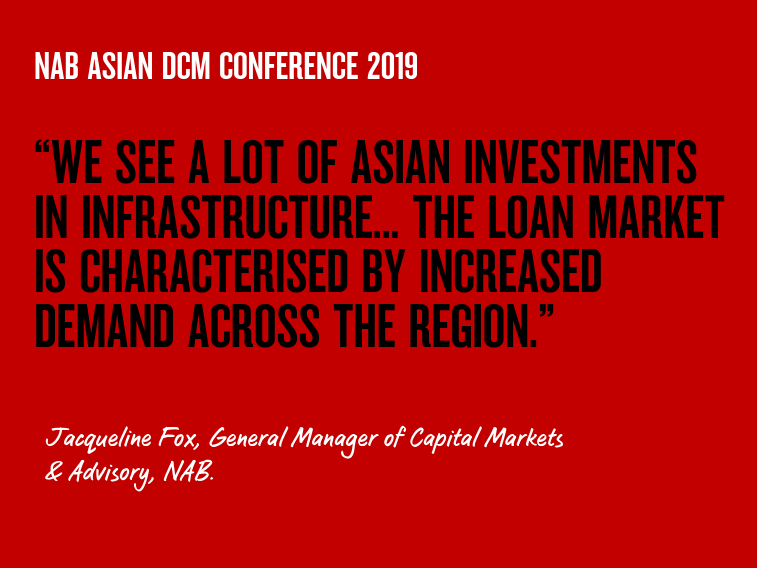Coming in for landing in a heavy cross wind


Insight
Panelists at NAB's annual DCM conference discussed the ideal confluence of demand and supply in the Asia Pacific (APAC) region, which is home to some of the worlds fastest growing economies.

NAB’s sixth annual Asia Pacific Debt Capital Markets Conference, held in Singapore, Hong Kong and Tokyo, brought together an array of investors and issuers to give them an opportunity to interact personally, understand each other’s needs and build valuable, long-lasting relationships.
The key takeaway from the gatherings – which also provided insights into the economic, geopolitical and regulatory issues currently shaping international debt markets – was that issuers from around the world view Asia as a key destination to fulfil their funding needs. In turn, Asia offers deep pools of liquid capital ready to meet this demand, especially for long-term financing to fund infrastructure projects in Australia, New Zealand and other markets.
As Tabitha Chang, Director Capital Markets Origination at NAB, put it: “There is exponential growth of capital across Asia and Asian investors are playing an increasingly important role in the capital markets as they look for alternative ways to put their money to work.”
Expanding horizons, growing commitments
The keynote address from independent economist Andy Xie explored the implications of the US-China trade war – a key concern for issuers and investors worldwide – noting that an escalation of this conflict of ideologies had the potential to disrupt global markets. Xie was concerned that negotiations were “not going well” and predicted the issue would “drag on for a long time”.
The panel discussing bond market developments and opportunities featured delegates from the Bank of New Zealand and Mitsubishi UFJ Financial Group who noted the growing presence and influence of Asian investors and issuers that is at once seen enhancing capacity and deal sizes, and bringing a welcome diversity to world markets.
Investors from across Asia are also playing a key role in growing the market for institutional term loans and syndicated products, observed the panel on alternative capital markets and investment solutions, which included New Zealand’s Fonterra and Melbourne-based Aquasure. This panel also highlighted trends in investors considering the expanding US private placement market that offers good issuer diversification, access to long-dated credit from high quality investment grade companies, resulting in good risk/reward outcomes.
The discussion on infrastructure financing featured issuers from a variety of sectors and geographies, including Heathrow Airport and Places for People in the UK, and the Port of Melbourne. In discussing their businesses and borrowing needs, the panellists agreed that demand for infrastructure financing would grow and sustain over the long term and noted that corporations are keen to increase their engagement with the investor base in Asia.
The discussion also emphasised companies’ increasing focus on Environmental, Social and Governance (ESG) factors and the growth of green bonds – an area of investment that is gaining traction globally and is also a key focus area for NAB.
“[ESG is] becoming increasingly important…because it’s the right thing to do,” observed Matt Cooper, Tax and Treasury Director at Places for People.
Strong fundamentals, patient capital
Delegates were also provided insights into NAB’s views on the global economy, the outlook for Australia and New Zealand, and the latest regulatory trends in these markets.
Noting the Australian Prudential Regulatory Authority’s (APRA) role in maintaining Australia’s economic vibrancy through past global crises, Nick Chaplin, Head of Hybrids and Structured Capital Origination at NAB, expressed optimism that APRA’s consultative approach would help build a regulatory framework that strengthens Australia’s financial institutions while furthering the development of the country’s markets.
Lending support to the consensus view that the investment outlook remained attractive, especially in the infrastructure sector, Ivan Colhoun, NAB’s global head of research, argued that while growth is slowing worldwide, economic fundamentals would continue to hold strong in the face of near-term challenges. “It’s not a crisis, it’s not a recession… in the end, we will get through these trade wars,” he said. “My bottom line for [Australia and New Zealand] is that, while they are not booming, they’re doing quite well.”
Lastly, favouring the long-term view, Rosalie Valladares, Director of Corporate and Infrastructure Coverage at Capital Markets Europe at NAB, urged everyone to “invest through the cycles, through the volatility.”
We hope these insights are of value to you and we look forward to welcoming you to our next Asia Pacific Debt Capital Markets Conference in 2020.
Read all the insights from the event in our DCM 2019 Wrap
Speak to a banker
© National Australia Bank Limited. ABN 12 004 044 937 AFSL and Australian Credit Licence 230686.